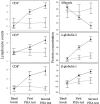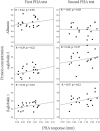The PHA test reflects acquired T-cell mediated immunocompetence in birds
- PMID: 18820730
- PMCID: PMC2546448
- DOI: 10.1371/journal.pone.0003295
The PHA test reflects acquired T-cell mediated immunocompetence in birds
Expression of concern in
-
Expression of concern: The PHA-skin test reflects acquired T-cell mediated immunocompetence in birds.PLoS One. 2012;7(11):e49617. doi: 10.1371/journal.pone.0049617. Epub 2012 Nov 8. PLoS One. 2012. PMID: 23145183 Free PMC article. No abstract available.
Abstract
Background: cological immunology requires techniques to reliably measure immunocompetence in wild vertebrates. The PHA-skin test, involving subcutaneous injection of a mitogen (phytohemagglutinin, PHA) and measurement of subsequent swelling as a surrogate of T-cell mediated immunocompetence, has been the test of choice due to its practicality and ease of use in the field. However, mechanisms involved in local immunological and inflammatory processes provoked by PHA are poorly known, and its use and interpretation as an acquired immune response is currently debated.
Methodology: Here, we present experimental work using a variety of parrot species, to ascertain whether PHA exposure produces larger secondary than primary responses as expected if the test reflects acquired immunocompetence. Moreover, we simultaneously quantified T-lymphocyte subsets (CD4(+), CD5(+) and CD8(+)) and plasma proteins circulating in the bloodstream, potentially involved in the immunological and inflammatory processes, through flow cytometry and electrophoresis.
Principal findings: Our results showed stronger responses after a second PHA injection, independent of species, time elapsed and changes in body mass of birds between first and second injections, thus supporting the adaptive nature of this immune response. Furthermore, the concomitant changes in the plasma concentrations of T-lymphocyte subsets and globulins indicate a causal link between the activation of the T-cell mediated immune system and local tissue swelling.
Conclusions/significance: These findings justify the widespread use of the PHA-skin test as a reliable evaluator of acquired T-cell mediated immunocompetence in diverse biological disciplines. Further experimental research should be aimed at evaluating the relative role of innate immunocompetence in wild conditions, where the access to dietary proteins varies more than in captivity, and to ascertain how PHA responses relate to particular host-parasite interactions.
Conflict of interest statement
Figures




References
-
- Sheldon BC, Verhulst S. Ecological immunology: costly parasite defences and trade-offs in evolutionary ecology. Trends Ecol Evol. 1996;11:317–321. - PubMed
-
- Martin LB, Han P, Lewittes J, Kuhlman JR, Klasing KC, et al. Phytohemagglutinin-induced skin swelling in birds: histological support for a classic immunoecological technique. Funct Ecol. 2006;20:290–299.
-
- Stadecker M, Lukic M, Dvorak A, Leskowitz S. The cutaneous basophil response to phytohemagglutinin in chickens. J Immunol. 1977;118:1564–1568. - PubMed
-
- Smits JE, Bortolotti GR, Tella JL. Simplifying the phytohemagglutinin skin-testing technique in studies of avian immunocompetence. Funct Ecol. 1999;13:567–572.
-
- Clotfelder ED, Ardia DR, McGraw KJ. Red fish, blue fish: trade-offs between pigmentation and immunity in Betta splendens. Behav Ecol. 2007;18:1139–1145.
MeSH terms
Substances
LinkOut - more resources
Full Text Sources
Research Materials

